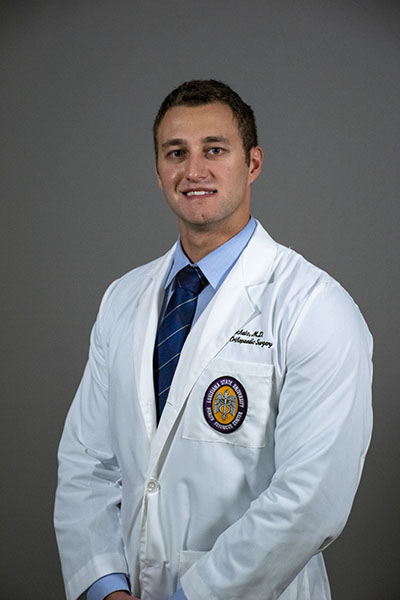Marc Schatz

Year
Graduated
Hometown
Cooper City, FL
What medical school did you attend?
University of Miami Miller School of Medicine
What undergraduate school did you attend? What did you study?
University of Miami-Neuroscience and Exercise Physiology
What were you looking for in a residency program when you selected LSU?
Strong operative experience, camaraderie, a chance to experience New Orleans.
What advice would you give to incoming residents?
Work hard, read and ask questions
Resident Spotlight:
Marc Schatz, M.D., a PGY-5 originally from Cooper City, Florida, arrived at LSU after completing medical school at the University of Miami Miller School of Medicine.
And what motivated Dr. Schatz to select orthopedics? Motivated patients!
“Not only do I enjoy the hands-on aspects of surgery, but I love that orthopedic patients
tend to be among the most motivated patients you could ever want, meaning that treatment
is not an uphill battle.”
Intensely interested in the biomechanical aspects of musculoskeletal care, Dr. Schatz
is undertaking new research on ankle fractures and early weight bearing. “We have
a lot of Medicaid patients who don’t have the luxury of taking time off from work.
These folks could end up losing their jobs and/or homes. In the past, we instructed
foot and ankle patients to stay off their injured leg up to three months after surgery.
However, we noticed that with our fixation, if we repaired the ligaments, patients
were usually able to get back to weight bearing at two weeks. We are examining data
from 300 of our patients to ensure that this is safe and that patients are compliant
with our instructions.”
Another intriguing topic, says Dr. Schatz, is the ongoing debate about what to do
when a fracture does not heal. “There is no specific protocol to follow when a fracture
doesn’t heal—other than finding the origin of the problem. We are using a multicenter
database to look at what makes those fractures different and how we might prevent
them.”
Having done his due diligence on LSU’s orthopedic program, Dr. Schatz noted, “I spoke
with several current and prior residents who were quick to say that trainees are allowed
a lot of autonomy in the OR. I noticed that there was a high level of trust in the
attendings, as well as an unusual degree of camaraderie in the program.”
“I firmly believe that the faculty and staff are devoted to our education—there is
no, ‘Just go look in a textbook’ kind of
attitude. We have a world-class lab with every tool imaginable, as well as space for
10-12 cadavers at the same time. Those running the lab are dedicated to ensuring that
the lab is properly maintained and that we can obtain additional equipment or vendor-specific
items when necessary.”
“When on rotation in Lafayette or Baton Rouge we have the unique opportunity of nearly
running a practice on our own, deciding which cases to book, and what types of treatment
to use. Yes, we are supervised, but this resident-run service is an unparalleled growth
experience.”
Dr. Schatz, who is slated to do a fellowship at Campbell Clinic Orthopaedics, has
advice for medical students. “Give LSU a thorough look because while the program may
not initially grab your attention, frankly, there is no way to properly describe the
experience it offers. You just have to rotate here and see for yourself how comfortable
the residents are in the OR, and how we succeed in handling very complicated cases.”
